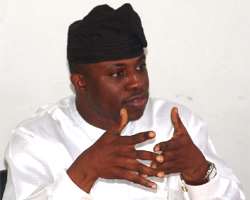REPS REJECT TWO-PARTY SYSTEM

Hon. Speaker, House of Representatives, Dimeji Bankole
Another rowdy session took place at the House of Representatives on Thursday as a proposal to re-introduce the two party system in Nigeria failed on the floor of the House.
The disagreement by the members of the House came barely 48 hours after they sharply differed on the modality for the confirmation of Alhaji Namadi Sambo, a former Kaduna State Governor, as vice-president.
One hundred and seventy two members voted in support of a multi-party system, 48 for a two-party system while one member abstained, according to results announced by the Speaker, Mr. Dimeji Bankole.
The House was divided into two halves for the lawmakers to be counted after they failed to agree on a voting pattern to be used to decide the contentious issue.
The majority of the Peoples Democratic Party-dominated House were clearly in support of the multi-party system, which is currently in use in the country. The Independent National Electoral Commission has 57 registered political parties on its list, although the majority lacks physical presence across the country
However, some PDP members like Mr. Independence Ogunewe; Mr. Dave Salako; Mr. Herma Hembe; and Mr. Chinyere Igwe supported the two party system.
These PDP members joined opposition party members led by the Minority Leader of the House, Alhaji Mohammed Ndume, to demand the re-introduction of the two-party system.
Ndume, a member of the All Nigeria Peoples Party, had two weeks ago, proposed an amendment to the Electoral Act 2006 to accommodate the two- party system.
The House is currently considering the report of its Special Ad-Hoc Committee on the Review of the 1999 Constitution on a 'Bill for an Act to Establish the Independent National Electoral Commission, Regulate the Conduct of Federal, State and Area Council Elections and Repeal the Electoral Act 2006 and for Related Matters, 2010.'
The House had been sharply divided over the two-party proposal and on two previous occasions, was unable to resolve the matter.
On Thursday last week, voting on the issue was deferred to Wednesday and later adjourned again to Thursday (yesterday).
Bankole's explanation for deferring voting on the two previous occasions was that members would have to vote with their electronic voting cards.
On Thursday (yesterday), most of the members came with their cards and the electronic voting system was working perfectly.
But, rather than ask that the electronic voting cards be used, the speaker opted for a voice vote, a decision those canvassing for two-party system saw as a ploy to manipulate the result.
Amid protests, Bankole called for a voice vote and ruled in favour of those supporting multi-party system.
Immediately, a row broke out with Ndume and Mrs. Abike Dabiri-Erewa leading other protesters to demand that the speaker should reverse the decision and allow members to use their voting cards.
Confusion reigned for several minutes as shouts of 'multi-party', 'two-party', 'five party' echoed in the chamber. At a point Bankole looked bemused and, sometimes, he hit his gavel on his desk, appealing for order.
With a group of lawmakers surging towards the mace, Bankole succumbed to pressure and reversed the ruling.
He told the protesters that he chose the voice vote option because there were members who did not bring their cards, adding that using the electronic voting card would have denied them voting rights.
The speaker said, 'It is my duty and responsibility to do the right thing; so, even those who do not have their cards, their votes must still count. Therefore, the best thing to do is to divide the House.'
The protests worsened but Bankole stood his ground and asked the Clerk of the House, Mr. Sani Omolori, to take a count of members on both halves of the chamber.
Omolori did the counting amid the protests and it was not clear who was counted on each side.
The clerk later handed over the result to Bankole who announced that 172 members supported multi-party system while 48 chose two-party system.
In the process, opposition party members and the PDP members who supported two-party system walked out of the chamber.
Among those that walked out were Ndume, Dabiri-Erewa, Ogunewe and Jumoke Okoya-Thomas.
Commenting on the development, Ogunewe stated that though he was a PDP member, there were situations when he had had to decide between what Nigerians wanted and his personal interest.
On her part, Dabiri-Erewa described the voting result as 'fraudulent', adding that the leadership manipulated the process to protect the PDP's interests.
She said, 'It is fraudulent; it is not about winning or losing but about the right to use our electronic voting cards.
'Those for two-party system could still have lost, but at least the voting would have been transparent. Why was the Speaker afraid to let us use the electronic cards? What happened was fraudulent, tyrannical, oppressive and unnecessary.
'One keeps wondering what reforms we are talking about. We have refused to even mention the Muhammadu Uwais-led Electoral Reform Committee report. We have ruled out option A4; and now this fraud.'
The Senate is yet to fix a date for its deliberations on the proposal for two-party system in Nigeria.
